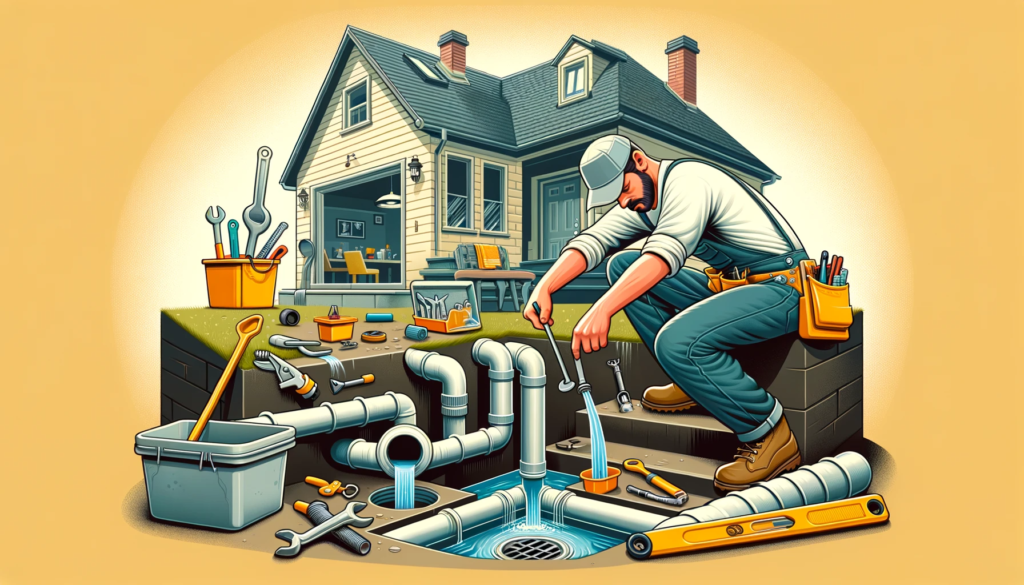Essential Guidelines for Basic Drain Maintenance

Key Takeaways:
| Maintenance Aspect | Key Point |
|---|---|
| Regular Practices | Adopt daily habits to prevent clogs and maintain clean drains. |
| DIY Solutions | Learn simple techniques for minor clogs before calling a professional. |
| Routine Care | Schedule regular drain maintenance to extend plumbing lifespan. |
| Eco-Friendly Solutions | Utilize natural cleaners to protect your pipes and the environment. |
| Early Sign Recognition | Act swiftly on signs of clogs to prevent bigger issues. |
| Essential Tools | Keep a plunger, snake, and other tools handy for quick fixes. |
| Professional Insight | Know when to seek help from a drain cleaning service. |
| Emergency Preparedness | Have a plan in place for unexpected drain emergencies. |
| Seasonal Considerations | Adjust maintenance strategies with changing seasons. |
| Targeted Cleaning | Address specific drain areas with customized care. |
| Avoiding Mistakes | Be wary of common drain maintenance misconceptions and errors. |
| Tackling Challenges | Use targeted strategies for grease, oil, and hard water. |
| Historic Homes | Exercise care when dealing with older plumbing systems. |
| Technological Developments | Stay informed about future drain maintenance innovations. |
| Commitment to Maintenance | Embrace the practice of preventative plumbing care. |
Introduction to Drain Maintenance
When it comes to home upkeep, your drainage system may not always be at the forefront of your mind, but it’s crucial for maintaining a healthy and functional household. Regular drain maintenance not only prevents inconvenient blockages but also extends the lifespan of your plumbing system and ensures it operates efficiently.
Key Takeaways for Basic Drain Maintenance:
| Consideration | Benefit |
|---|---|
| Preventing Blockages | Avoids emergencies and damage |
| Extending System Lifespan | Saves money on major repairs |
| Ensuring Efficient Operation | Reduces water and energy waste |
For a detailed guide on maintaining your drainage system, check out our comprehensive resource on Basic Drain Maintenance.
Understanding Your Drain System
Before diving into maintenance tips, it’s important to understand the anatomy of your home’s drainage system. Your system typically includes sink drains, toilets, and main sewer lines, each prone to different issues such as build-up from soap, food waste, hair, and other materials.
Common Issues Affecting Drains:
- Slow draining sinks indicating potential clogs
- Gurgling sounds signifying trapped air within the pipes
- Foul odors caused by food debris and bacterial growth
For more information on the structures within your plumbing and how they can be affected, read about the Role of Drain Cleaners in maintenance.
Daily Practices for Healthy Drains
Habits to Keep Drains Clear:
Incorporating effective daily practices is a powerful step towards preventing clogs and keeping your drains in top shape. Simple habits, like running hot water through the sink after each use, can greatly reduce the likelihood of clog formation by flushing away newly formed debris.
- Use mesh screens to catch hair and food particles.
- Don’t pour grease or oil down the drain; dispose of it in the trash.
- Brush your hair before showering to minimize hair fall in the bathroom drain.
Beware of products that claim to clear drains but may contain harsh chemicals. Read about the Safe Chemical Drain Cleaners to choose wisely.
DIY Drain Cleaning Methods
Sometimes, a blocked drain can be tackled without professional help. Having the knowledge of a few DIY methods for drain cleaning can save time and money. However, remember to exercise caution and never force a solution that could lead to more damage.
Simple Cleaning Techniques Include:
- Boiling water: Regularly pouring boiling water down the drain can prevent oil and grease from solidifying.
- Baking soda and vinegar: A natural chemical reaction that can help clear minor clogs.
For those tricky situations, using a plunger or a drain snake might be necessary. Learn more about DIY Drain Cleaning for step-by-step instructions on these methods.
The Power of Routine Drain Care
Establishing a routine strategy for drain maintenance is not just about solving current problems; it’s about preventing future ones. Marking your calendar for regular check-ups and cleanings can save you from the inconvenience and expense of emergency plumbing repairs.
Schedule for Regular Maintenance:
| Frequency | Task |
|---|---|
| Weekly | Hot water flush and visual inspection |
| Monthly | Baking soda and vinegar treatment |
| Quarterly | Professional inspection (if required) |
| Annually | Full system cleaning by a professional |
Understand how routine care impacts long-term plumbing health by exploring The Importance of Regular Drain Cleaning.
Natural and Eco-Friendly Cleaning Solutions
Turning to natural and eco-friendly solutions for your drain cleaning needs is not only better for the environment but also gentler on your pipes and health. Avoiding the use of harsh chemical cleaners can prevent pipe corrosion and the buildup of toxic fumes.
Homemade Natural Cleaning Recipes:
- Mixture 1: 1 cup of baking soda followed by 1 cup of white vinegar
- Mixture 2: Lemon juice and salt for a fresh scent and mild abrasive action
- Mixture 3: Hot water mixed with dish soap for grease dissolution
Learn about options that keep your drains and the planet safe at Eco-Friendly Drain Cleaning.
Recognizing Early Signs of Clog Development
Being vigilant and able to recognize the early signs of drain issues can make all the difference in maintaining a smooth-running plumbing system. Addressing problems early on can prevent more serious clogs and damage.
Indicators of Potential Blockages:
- Water pooling around shower drains
- Water backing up in sinks or basins
- Slow draining after a flush or running the tap
Acting upon these preventative steps is crucial; read more on Preventing Drain Clogs to stay ahead of plumbing issues.
Tools Every Homeowner Should Have
Equipping yourself with the right tools can empower you to handle basic maintenance tasks effectively. Having these essential tools at hand is part of being a prepared homeowner.
Essential Drain Cleaning Tools:
- Plunger: Best for minor clogs in sinks, showers, and toilets.
- Drain snake or auger: For deeper, more stubborn clogs.
- Drain cleaning brush: Helpful for routine cleaning and debris removal.
Understanding how to use these tools can be a lifesaver. For more insights, consider reading about Drain Cleaning Tools.
Professional Help: When and Why to Call
There are instances when a professional’s expertise is not just helpful, but necessary. Certain situations, such as recurring clogs, multiple clogged drains, or suspected sewer line issues, require specialized equipment and knowledge.
Situations Requiring Professional Help:
- Persistent clogs that don’t respond to DIY methods
- Foul odors emanating from drains indicating possible sewer line issues
- Water or sewage backup in your home
For understanding the benefits and knowing when to call in the experts, read about Professional Drain Cleaning Services.
Dealing with Emergencies: Quick Response Tips
A drain emergency can happen at any time, and reacting quickly and correctly is essential to minimizing damage. Knowing what to do in the first few moments can mean the difference between a quick fix and costly repairs.
Steps to Take During a Drain Emergency:
- Shut off the water to the affected area if possible.
- Avoid using chemical drain cleaners that can worsen the situation.
- Contact a professional immediately if you cannot resolve the issue quickly.
Read up on emergency situations and how to handle them at When to Call Professional Drain Cleaning.
Seasonal Maintenance for Changing Needs
Changing seasons bring different challenges for your drains, and adjusting your seasonal maintenance practices is crucial for preventing issues. For example, fall may bring leaves that clog outdoor drains, while winter can pose the risk of frozen pipes.
Adjustments for Seasonal Maintenance:
| Season | Maintenance Focus |
|---|---|
| Spring | Check for winter damage and clear any accumulated debris |
| Summer | Prepare for increased use with frequent inspections |
| Fall | Clear leaves and debris from outdoor drains and gutters |
| Winter | Insulate pipes to prevent freezing |
Learn how to tailor your approach with our guide on Seasonal Drain Maintenance.
Addressing Specific Drain Areas
Different drains in your home have unique requirements, and knowing how to address them specifically will keep them functioning properly. For instance, kitchen sinks often contend with grease and food particles, while bathroom drains deal with hair and soap scum.
Tips for Addressing Specific Drain Areas:
- Kitchen Sink: Regularly clean with boiling water and a dish soap mixture.
- Bathroom Drain: Install hair catchers and use a weekly baking soda treatment.
- Outdoor Drains: Keep clear of leaves and use a hose to flush out debris occasionally.
For more targeted advice, explore our resources on Cleaning Different Drains.
Preventing Common Mistakes in Drain Maintenance
Awareness of common drain maintenance misconceptions is key to protecting your plumbing system. From using the wrong cleaners to treating all clogs the same, understanding what not to do is as important as knowing the correct practices.
Common Mistakes to Avoid:
- Overreliance on chemical cleaners which can harm your pipes
- Ignoring the early signs of drain issues
- Treating all drains identically regardless of their specific needs
For a comprehensive list of do’s and don’ts, check out Avoiding Drain Cleaning Mistakes.
Tackling Tough Challenges: Grease, Oil, and Hard Water
Certain substances like grease, oil, and mineral buildup from hard water can pose significant challenges to maintaining clean drains. These require specific strategies to prevent and address efficiently.
Strategies for Tough Substances:
- Grease and oil: Wipe pans with a paper towel before washing and use grease-fighting dish soap.
- Hard water: Install a water softener or descaler to mitigate mineral buildup.
Learn detailed strategies for managing these issues in Dealing with Grease and Oil in Drains and Hard Water’s Impact on Drains.
Maintaining Drains in Older Homes
Owners of old homes face unique challenges when it comes to plumbing maintenance. The pipes in older houses may not only be made of materials prone to corrosion but also more susceptible to sediment buildup and breakage.
Special Considerations for Older Plumbing:
- Regular inspections to check for corrosion and leaks
- Gentle cleaning methods to avoid damaging fragile pipes
- Potential upgrades or replacements to outdated systems
For maintaining the delicate balance between historic integrity and functional plumbing, delve into our article on Drains in Older Homes.
The Future of Drain Maintenance
The world of drain maintenance is evolving with technological advancements offering new solutions for age-old problems. From smart pipes that detect leaks to enzyme-based cleaners that offer an eco-friendlier option, the future of plumbing maintenance looks bright and efficient.
Innovations in Drain Maintenance:
- Smart technology for early leak detection
- Enzyme and bacteria-based cleaners as alternatives to chemicals
- High-pressure water jets for thorough cleaning without damage
Keep up with emerging trends and technologies in drain maintenance by reading about Future Drain Cleaning Tech.
Conclusion: Embracing Regular Drain Care
Embracing regular drain maintenance is an invaluable practice for any homeowner. It’s about adopting a proactive approach, recognizing the early warning signs of drain distress, and taking the necessary steps to address and prevent issues from escalating into costly emergencies.
Final Key Takeaways for Drain Maintenance Success:
| Tip | Description |
|---|---|
| Stay Informed | Keep learning about your specific drain care needs |
| Act Early | Respond quickly to the first signs of trouble |
| Use the Right Tools | Equip yourself with basic tools and know when to call professionals |
| Eco-friendly Approaches | Use natural solutions when possible to protect your pipes and the environment |
| Seasonal Adjustments | Adjust your maintenance routine with the changing seasons |
| Professional Insight | Don’t hesitate to seek professional advice when in doubt |
For continued support in your drain maintenance journey, explore our resources on Drain Cleaning Preventative Maintenance.




